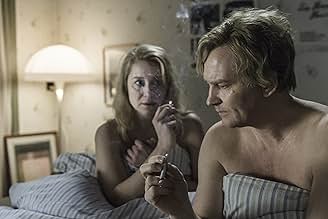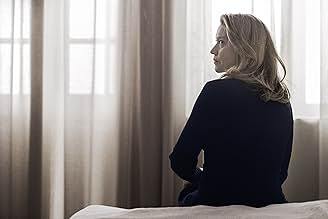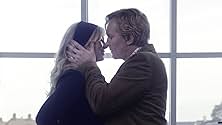AVALIAÇÃO DA IMDb
6,4/10
8,5 mil
SUA AVALIAÇÃO
Uma história sobre o choque entre desejos pessoais, solidariedade e tolerância em uma comuna dinamarquesa nos anos 70.Uma história sobre o choque entre desejos pessoais, solidariedade e tolerância em uma comuna dinamarquesa nos anos 70.Uma história sobre o choque entre desejos pessoais, solidariedade e tolerância em uma comuna dinamarquesa nos anos 70.
- Direção
- Roteiristas
- Artistas
- Prêmios
- 6 vitórias e 21 indicações no total
Avaliações em destaque
The emotional upheaval of a tightly-knit community has become Thomas Vinterberg's trademark as a film maker. He explored this theme with great success in 'Festen' and in 'Jagten', and now he does it in 'Kollektivet'. This time, the community is a group of people living together in a large house, a way of living that was trendy in the sixties and seventies. The group consists of friends and acquaintances of architect Erik and journalist Anna. Together, they fill up the huge villa he inherited from his parents. Anna thinks this social experiment can add some spice into her life. After all, she has been married to the same man and doing the same job for fifteen years.
But the cozy atmosphere of having meals and drinking beer together with a group of friends, turns sour when Erik introduces someone new into the group: his girlfriend, a young and pretty student. His wife Anna agrees with this arrangement, and in fact proposes it, hoping to keep Erik close to her. But predictably, the whole experiment ends in tears, fights and bitter reproaches.
Vinterberg's film has a different tone of voice than 'Festen' and 'Jagten'. It is a bit more lighthearted, and less harsh. He not only analyzes the emotional feelings of the characters, but also shows how society has changed in the last forty years. What struck me, was how easily Erik gets away with abject male-centred behaviour. He cheats on his wife practically in front of her eyes, and seems to have hardly any emotional connection to her or their daughter. In the end, it is his girlfriend who has to point out to him that his wife is having an emotional breakdown. But even then, he doesn't see the damage he has created. Instead, he complains that all these 'women issues' distract him from his work. Nowadays, a man would get a slap in the face after saying something like that.
The seventies-atmosphere adds an extra dimension to the film, and the period setting makes it an easier viewing experience than 'Jagten' or 'Festen'. At the same time, it is also less intense. It's nice to watch, but doesn't make you shift uneasily in your chair.
But the cozy atmosphere of having meals and drinking beer together with a group of friends, turns sour when Erik introduces someone new into the group: his girlfriend, a young and pretty student. His wife Anna agrees with this arrangement, and in fact proposes it, hoping to keep Erik close to her. But predictably, the whole experiment ends in tears, fights and bitter reproaches.
Vinterberg's film has a different tone of voice than 'Festen' and 'Jagten'. It is a bit more lighthearted, and less harsh. He not only analyzes the emotional feelings of the characters, but also shows how society has changed in the last forty years. What struck me, was how easily Erik gets away with abject male-centred behaviour. He cheats on his wife practically in front of her eyes, and seems to have hardly any emotional connection to her or their daughter. In the end, it is his girlfriend who has to point out to him that his wife is having an emotional breakdown. But even then, he doesn't see the damage he has created. Instead, he complains that all these 'women issues' distract him from his work. Nowadays, a man would get a slap in the face after saying something like that.
The seventies-atmosphere adds an extra dimension to the film, and the period setting makes it an easier viewing experience than 'Jagten' or 'Festen'. At the same time, it is also less intense. It's nice to watch, but doesn't make you shift uneasily in your chair.
"The Commune" brings the story of Eric and Anna. As the movie opens, we see the couple looking at the huge house of Erik's deceased father. The couple really can't afford to keep the house, but at Anna's suggestion, they invite several other people to join them (and pay rent). All together, they are now 9, of which 2 kids (including Anna and Erik's 14 yr. old daughter Freja). Then, just as things seem to go quite well, Erik starts an affair with Emma, a 24 yr. old student of his. What impact will that have on the commune? To tell you more of the plot would spoil your viewing experience, you'll just have to see for yourself how it all plays out.
Couple of comments: this is the latest movie from Danish writer-director Thomas Vinterberg, whose work includes 2015's "Far From the Madding Crowd" and before that, the excellent "Hunt" in 2012. Here, after going "Hollywood" in his previous movie, he returns to his Danish roots and brings us a story set in the 1970s, when the concept of morality and conformity were quite different from what we now know them to be. This movie turned out to be a bit different from what I expected it to be. It's not really about "hippies living together and being one with nature", but rather a study of what one man's affair means for the immediate group around him, including of course first and foremost his wife, a slightly aging but very popular TV news anchor. The film also spends quite of time looking at the 14 yr. old girl, and in that sense is also partly a coming of age movie. There are a couple of acting performances that will knock you out, none more so that Trine Dyrholm in the role of Anna, but Ulrich Thomsen as Erik certainly should be mentioned to.
I recently saw "The Commune" at the Landmark E Street Cinema in Washington DC. The Saturday evening screening that I saw it at was attended okay but not super. That's a shame, but maybe this movie will find a wider audience on Amazon Instant Video or eventually on DVD/Blu-ray. If you are in the mood for a quality foreign film that is in part a relationship drama and in part a coming-of-age movie, I'd readily recommend you see this out.
Couple of comments: this is the latest movie from Danish writer-director Thomas Vinterberg, whose work includes 2015's "Far From the Madding Crowd" and before that, the excellent "Hunt" in 2012. Here, after going "Hollywood" in his previous movie, he returns to his Danish roots and brings us a story set in the 1970s, when the concept of morality and conformity were quite different from what we now know them to be. This movie turned out to be a bit different from what I expected it to be. It's not really about "hippies living together and being one with nature", but rather a study of what one man's affair means for the immediate group around him, including of course first and foremost his wife, a slightly aging but very popular TV news anchor. The film also spends quite of time looking at the 14 yr. old girl, and in that sense is also partly a coming of age movie. There are a couple of acting performances that will knock you out, none more so that Trine Dyrholm in the role of Anna, but Ulrich Thomsen as Erik certainly should be mentioned to.
I recently saw "The Commune" at the Landmark E Street Cinema in Washington DC. The Saturday evening screening that I saw it at was attended okay but not super. That's a shame, but maybe this movie will find a wider audience on Amazon Instant Video or eventually on DVD/Blu-ray. If you are in the mood for a quality foreign film that is in part a relationship drama and in part a coming-of-age movie, I'd readily recommend you see this out.
Thomas Vinterberg performs an experiment / study of the human personality by gathering a gallery of characters (with whom it is difficult to identify yourself personally) and placing them in an extreme situation of coexistence. The supposed pragmatism or cold- blooded of Nordic people to face problems, here blows up. The ability of the director makes the viewer to take part inadvertently in the plot of the film as one more character of his work. Anna, TV presenter. and Erik professor of architecture form together with his teenage daughter an apparently happy family with no more complications than "the problem" of managing the use of a big inherited house. So great the house that they decide to share the use. The new experience begins with great joy but ends up in a dramatic way by crushing the promoter of the idea of sharing the house. It is interesting to observe the behavior of the teenage daughter through the story and also trying to understand how difficult it can be for a teacher accustomed himself to dominate students and situations from a position of strength to have to give up the domain of his house and almost his way of life for the general interest of a group composed by people whose specific weight is equal to nothing; the parasite that barely contribute, the "bums" that do not compromise themselves in anything, a liberal couple contributing to the experiment with a sick child who possibly might have been better brought up in the privacy of a normal home, etc. In summary, this film is full of teachings and is a great exercise in the expression of different behaviors, through the coexistence of a group of people with whom (out of the movie) it would be difficult to establish a friendship and still less to share your life. Finally highlight the great interpretation of the wife versus the weak of Erik's lover. talking of actresses terms, of course. The plot is set in 1970 but this fact is totally irrelevant.
This is quite a slow burner, plot pace wise. Its mostly about family dynamics and trust. It took a while for me to feel especially interested in the characters but I thought it was somewhat of a powerful watch by the time it headed towards the end and I would say it may make you think.
If your not keen on character focussed dramas then this won't be for you. Also of course you likely have to rely on the subtitles, as its in Danish, although I was pleased to see that the subtitles were quite large in terms of text size, compared to other films with smaller subtitles, so if anything it was slightly less of an issue than it might have been. I felt sorry for the wife Anna and I did find myself wondering what might happen next, as things moved on plot wise but it is, as I say, a relatively slow burner, so don't expect fast paced action or anything of that sort. Its a reasonably intriguing watch and overall I suppose I'd say its a good watch, hence my rating.
If your not keen on character focussed dramas then this won't be for you. Also of course you likely have to rely on the subtitles, as its in Danish, although I was pleased to see that the subtitles were quite large in terms of text size, compared to other films with smaller subtitles, so if anything it was slightly less of an issue than it might have been. I felt sorry for the wife Anna and I did find myself wondering what might happen next, as things moved on plot wise but it is, as I say, a relatively slow burner, so don't expect fast paced action or anything of that sort. Its a reasonably intriguing watch and overall I suppose I'd say its a good watch, hence my rating.
The story is not a good study of characters. All of them are almost caricatures. When the existential problem between Erik and Ana arises, both behaves in a way too much elementary, taking in account the gravity of the situation which is going on. More precisely (1) Erik is absolutely incapable to realise that he is ruining the emotional life and the self respect of the woman with whom he has been married and living in a pleasant way during at least fifteen years. A woman who proved to be generous when she accepted that Emma could live with the community, and who had probably fantasies of living a ménage à trois, along with Erik and Emma, thing that I think reasonable and human, considering what was going on. Erik sticks with Emma as if he hadn't any responsibility with regard to Anna feelings. (2) Anna is incapable to react in time to rescue her dignity which is being hurt by the irresponsible behaviour of Erik. The rest of the characters manifest themselves very poorly with respect to the crisis between Erik an Anna. Except the young Freja, daughter of Erik and Anna which is the only one capable to say that her mother must leave the community and seek for a new life. In short, Erik who is almost a pivot of the whole story, behaves - in the light of existentialist philosophy - as an individual with bad faith. I would add also, on my part, that he is a kind of mediocre individual.
Você sabia?
- CuriosidadesThe film is based on Thomas Vinterberg's play of the same name, which is inspired by his colourful childhood in an academic commune north of Copenhagen.
- Erros de gravaçãoThe signs on the bus stops were not introduced until the late 80's or 90's.
Principais escolhas
Faça login para avaliar e ver a lista de recomendações personalizadas
- How long is The Commune?Fornecido pela Alexa
Detalhes
Bilheteria
- Faturamento bruto nos EUA e Canadá
- US$ 38.737
- Fim de semana de estreia nos EUA e Canadá
- US$ 9.249
- 21 de mai. de 2017
- Faturamento bruto mundial
- US$ 4.410.339
- Tempo de duração1 hora 51 minutos
- Cor
- Mixagem de som
- Proporção
- 2.35 : 1
Contribua para esta página
Sugerir uma alteração ou adicionar conteúdo ausente




























